
 I understand that I am a week or so behind the curve on this topic. It was early last week when the Big Machine Label Group and Clear Channel cut a deal that had Nashville and Washington, DC. buzzing for a day or two.
I understand that I am a week or so behind the curve on this topic. It was early last week when the Big Machine Label Group and Clear Channel cut a deal that had Nashville and Washington, DC. buzzing for a day or two.
I think much of the buzz was because of the timing of the announcement. Many broadcasters were surprised (and angered) that this came down the day before they were going before Congress with this issue on the agenda.
Much of the buzz has died down since because most people see this as inconsequential today. It appears to be much ado about not much. I don’t believe that the actual number was ever publically announced and not many outside of Scott Borchetta and Bob Pittman actually know it. Or know the real purpose of the deal.
I want to go on record as saying that Scott is a friend of mine. I consider him a first class promotion person, businessperson and he has proven to be a step ahead of most others in Nashville for several years now.
I have met Bob but he wouldn’t know me if I stepped on his toes in an elevator. I have written in the past that I think that Bob is good for broadcast radio. I like high profile people saying good things about the business and he is radio’s number one cheerleader.
I cannot tell you who went to whom with this idea. This would be in character for either of them. They could both see a promotional benefit. Scott sees a benefit of this being announced at the beginning of CMA week in Nashville and Bob sees this as a benefit to control the room the day before Congress meets. Who the hell knows who benefits the most from the announcement’s timing?
That can be said of the entire deal. Mr. Pittman says that iHeartRadio accounts for 2% of the CCME business today. I wonder if this deal also is going to include Cumulus? Cumulus is soon to be part of iHeartRadio so is it automatically included in this deal?
Does Mike Dungan now say, “Hey, what about my music? I have more music on Clear Channel digital than Scott does. Where is my cut?” What about Gary Overton?
I thought that all of this digital money was supposed to be shared across the entire recording platform. Wasn’t that the original thought? How could radio chains and labels possibly do separate deals?
RIAA says it likes the “acknowledge(ment)” of Clear Channel. RIAA’s Cary Sherman calls this a “breakthrough.”
The National Association of Broadcasters and musicFIRST danced to separate songs after the announcement but it will be interesting to see if this moves the issue forward. I guess that it is possible these organizations know the inside of the deal and maybe this will be a starting point. If that is the case then something good may come from the agreement.
My fear is that Mr. Pittman has taken the issues important to broadcasters off the table. This is not just a digital issue. Radio needs help with FM chips and performance rights costs that deal with music on the broadcast side.
Because radio provides a 360 experience to listeners, not just online, it is in radio’s best interest to keep all of our leverage on the table.
Without question the digital royalty structure is out of whack. But people like Tim Westergren, who does nothing in the public interest, to demand a level playing field is ludicrous. Let him step up and provide public service, daily and during times of tragedy, then he can ask for level playing field.
You do not have a level playing field because you stream music. That’s it.
Until you provide more than just the music, pay your 50% of total revenue and recognize that the model is a tough one. That’s why broadcasters are not willing to come down to your level.
I hope that Scott and Bob see way down the field and have a plan that works on every level.
(The views expressed in this article are those of the author and do not necessarily reflect those of MusicRow.)



